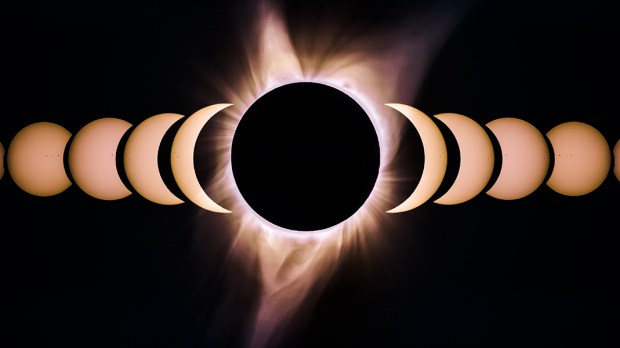Whenever an eclipse happens, various biblical passages are cited, often with end times implications.
The word “eclipse” does not appear in most modern English translations of the Bible, but there are many different passages that seem to describe an eclipse.
Old Testament
For the stars of the heavens and their constellations
Isaiah 13:10
will not give their light;
the sun will be dark at its rising
and the moon will not shed its light.
When I blot you out, I will cover the heavens,
and make their stars dark;
I will cover the sun with a cloud,
and the moon shall not give its light.
Ezekiel 32:7
The earth quakes before them,
Joel 2:10
the heavens tremble.
The sun and the moon are darkened,
and the stars withdraw their shining.
New Testament
The synoptic gospels (Matthew, Mark, and Luke) note that the sun is darkened during the day at the time of the crucifixion. Probably the most famous passages New Testament passages are those that refer to the end times. Jesus says:
Immediately after the tribulation of those days, the sun will be darkened … and he will send out his angels with a loud trumpet call, and they will gather his elect from the four winds, from one end of heaven to the other
Matthew 24:29, 31
The Book of Revelation also has an ominous passage.
When he opened the sixth seal, I looked, and behold, there was a great earthquake; and the sun became black as sackcloth, the full moon became like blood.
Revelation 6:12
Does this mean that the end of the world will occur after the next eclipse?
Biblical scholar Dr. Brant Pitre explains, “In the Old Testament, often eclipses or the darkening of the sun were interpreted as signs of divine judgment.”
However, Pitre mentions that these celestial signs were viewed as “a day of judgment, but also a day of salvation. When Christ is crucified, the darkening of the sun symbolizes both judgment and salvation.”
On a more natural level, it is important to note that a total solar eclipse happens frequently around the world and is not a unique event.
Space.com states, “Approximately once every 18 months (on average) a total solar eclipse is visible from some place on the Earth’s surface.”
We do not know the day nor the hour of Christ’s coming, though the Bible often uses an eclipse to symbolize God’s judgement.


